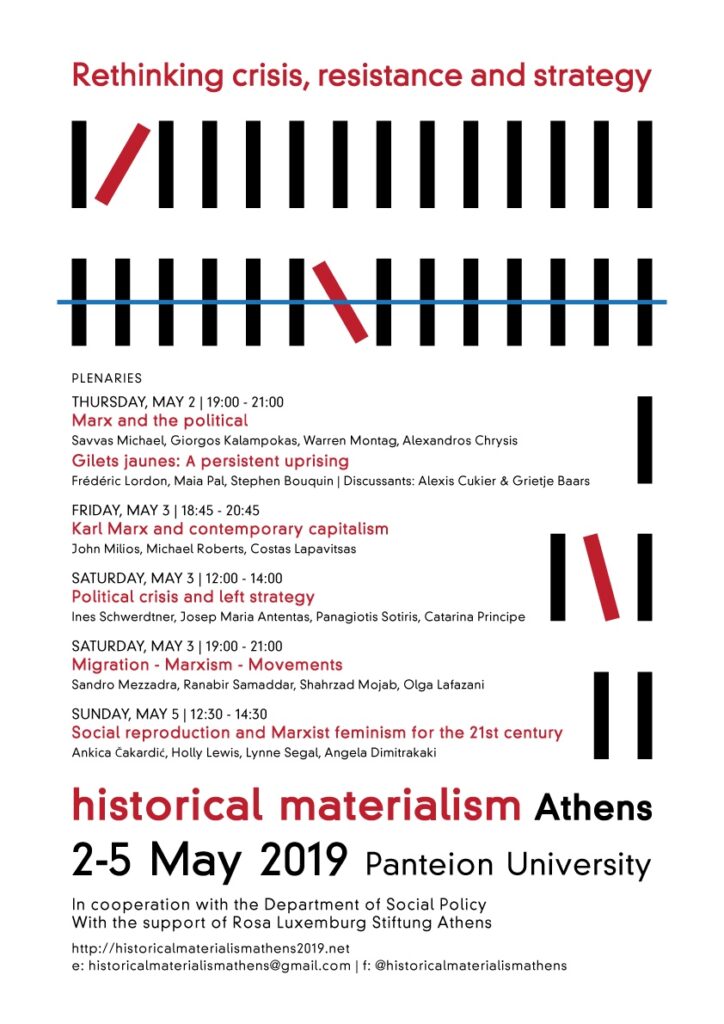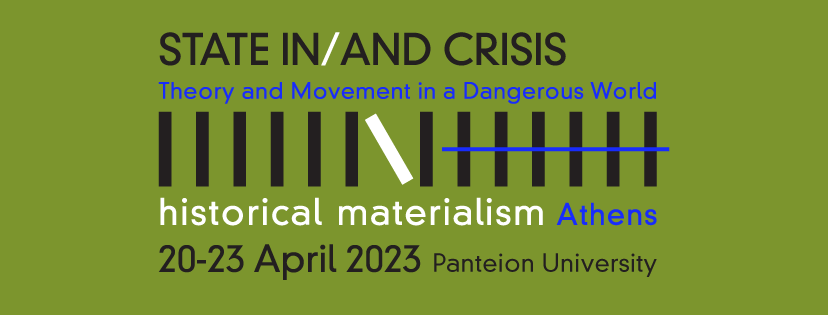
HM Athens website here.
Μessage from the HM Athens 2019 Organising Committee
Dear participants,
We would like to thank you for attending the Historical Materialism Athens Conference 2019 and for contributing to the dialogue and the exchange of ideas.
For us, the conference has been a wonderful experience of interdisciplinary Marxist discussion, expanding the dialogue upon questions that are not only theoretically important but also politically pertinent. We would like to think that it was not just another academic conference but an opportunity to converse and debate in a comradely and egalitarian manner. Of course, all this would not have been possible without your presentations and interventions, for which we are grateful.
At the same time, we would like to apologise for any problems or inconveniences you may have experienced and ask you to bear in mind that this was the first such conference organised in Greece and that Greek Universities are still suffering the consequences of austerity policies. We would like to urge you to send us your feedback on this collective theoretical and political experience; especially, criticisms concerning things that you believe went wrong, and suggestions on how to make the conference better in the future.
We take this opportunity to thank again the Department of Social Policy at Panteion University for its cooperation, the Rosa Luxemburg Stiftung (Office in Greece) for its support and, above all, the volunteers—students but also researchers and activists—whose hard work and commitment made the conference possible.
In the next few days, we will discuss and review the conference and also announce our plans for the next Historical Materialism Athens Conference. As mentioned during the conference, any participant who requires a certificate of attendance can send us an e-mail and we will provide him/her with one. If you have any panel recordings, videos, or photographs from the conference, kindly also send them to us. We will try to put online as many discussions/panel recordings as possible.
We urge you to check the Call for Papers for HM London Conference 2019 and send paper and panel proposals to: http://www.historicalmaterialism.org/conferences/sixteenth-annual-conference. We also invite you to check the HM Ankara 2020 Conference whose CfP will soon be circulated.
Finally, we would like to urge participants to take up subscriptions to the Historical Materialism journal (and ask your institutions to subscribe to both the Journal and the Book series). We would also like to urge you to contribute to the journal. Historical Materialism encourages submissions from social groups historically marginalised and discriminated on the basis of race, ethnicity, gender, disability, sexuality and other ways, as they are underrepresented in academic scholarship.
Again, many thanks for coming, presenting, discussing and contributing to the first Historical Materialism Athens conference!
In Solidarity,
The Organising Committee of the Historical Materialism Athens Conference
e: historicalmaterialismathens@gmail.com
w: https://hmathens.org/
f: @historicalmaterialismathens

Rethinking crisis, resistance and strategy
Historical Materialism Athens Conference
2-5 May 2019
Panteion University
In cooperation with the Department of Social Policy, Panteion University Athens
Call for papers
In the past years Greece became a case-study not only for the dynamics of the combined crisis of neoliberal capitalism and the European Integration, but also for the possibility of mass movements and resistances to drastically alter the political balance of forces. However, subsequent developments also brought to the fore another crisis: the crisis of left strategy, exemplified in the defeat of the struggles and aspirations of the subaltern classes in Greece; in the inability to produce a radical alternative to the neoliberal European Integration and in the aggressive return of the xenophobic far right in its various forms.
These developments underline the need to open up once again the theoretical debate regarding the capitalist crisis, the forms of bourgeois hegemony, and the form of a potential hegemonic project of the subaltern classes. They underline the need for a return to Marxist theory and historical materialism in order to conceptualize and problematize the new forms of crisis, resistance and hegemony.
This calls for an attempt to answer crucial theoretical (and political) questions:
What are the character and the manifestations of the capitalist crisis? How it is linked to the current forms of rivalry and antagonism in the international plane? What forms does the crisis of European Union take? How do recent developments, from the authoritarian turn in the Spanish State in regards to the Catalan independence movement to the rise of far right authoritarian governments in countries such as Hungary relate to the broader pattern of political crisis?
What kind of movements and struggles have experienced during the crisis period? What new forms and practices of resistance and organization have emerged? Which has been the role of youth in recent movements? How do we create new forms of unity and common struggle with refugees and migrants, and more generally with the diverse subjects of oppression and emancipation? What does the expansion of the state of emergency mean regarding struggles for democracy and social and political rights?
How can we revisit the question of the state and state power in the light of the developments in countries such as Greece? Is it possible for a ‘left government’ to be part of a radical socialist strategy or it will lead to capitulation? How can we learn from other experiences such as the Latin American ‘pink tide’? Is it possible to rethink today the possibility of a revolutionary road?
What is the role of theory in the attempt to deal with these questions? What forms of collective research can we think of? How can we combine the openness of the debate with the militant commitment to struggle?
In contrast to traditional political debates, marked by a combination of empiricism and dogmatism, in order to produce contemporary radical answers we need solid theoretical research and dialogue. Historical Materialism and the Marxist tradition, in all its complexity and richness offer the necessary starting point. 200 years after the birth of Karl Marx we need a new wave of Marxist theoretical research, associated with the crucial questions of our times; the “urgent tasks of our movement”.
It is in light of the above questions that we undertake the initiative to launch this Call for Papers for the first Historical Materialism Conference to be held in Athens (2-5 May 2019) based upon the basic guiding threads of Historical Materialism Conferences. We strongly encourage proposals on all potential subjects associated with the main thematic of the conference but also on questions associated with overall Marxist theory and Historical Materialist research.
Separate Call for Papers for specific streams will be issued separately.
- The language of the conference will be English.
- The conference is open to proposals for panels and papers on any subject within the central thematic of this Call for Papers, but also within the purview of Marxist and left radical thought and politics.
- Each proposal must include a title for the paper, an abstract of up to 400 words, names, affiliations and contact details of the person(s) making the proposal.
- In the case of panel proposals please include abstracts and contact details for each presentation. We reserve the right to reject certain abstracts in such panels (i.e. these are not “take it or leave it” as a whole) and to reconstitute the panels in different ways where necessary.
The deadline for paper / abstract proposals was November 30, 2018.
